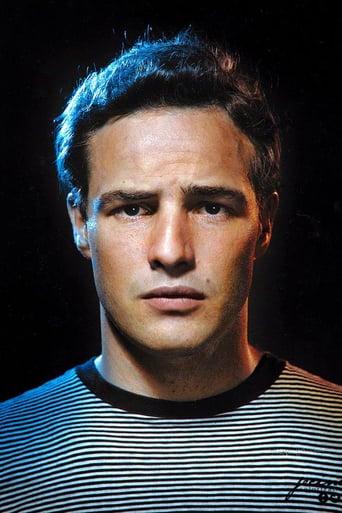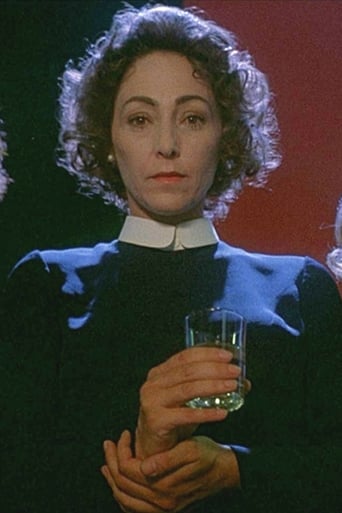Cathardincu
Surprisingly incoherent and boring
BoardChiri
Bad Acting and worse Bad Screenplay
PaulX7
It could have been a great movie but instead, it was wasted by movie director Bernardo Bertolucci, who is a poor excuse of a human being. He takes himself too seriously that he forgot he is just a movie director and it is just a movie. The rape scene in the movie was in fact a real rape: the scene was never consensual, he never even informed the actress, Maria Schneider, who was only 19 at the time, about the scene and instructed Brando to rape her, literally. Is it worth destroying a woman's life, for a movie? Seriously? Disgusting human being, and unethical. Some so-called "artists" take themselves too seriously, very pretentious.
lasttimeisaw
For a man, what could be more personally satisfying than overpowering his perfect object of desire solely by his sexual prowess? That's the scenario in Bertolucci's self-fulfilling, exotic and provocative LAST TANGO IN Paris, telling based on his own sexual fantasies, a privilege which has been a substantial stimulus to encourage generations of youngsters to become a filmmaker, but only those very few in the top tier can achieve that gratification with momentum and flourishes, even Bertolucci couldn't get away with lambaste and the film has been perpetually on the list of films that shock the world!Jeanne (Schneider), a 20-year-old parisienne, comes across a near-rape sexual intercourse with a middle-aged American expatriate Paul (Brando) in an empty apartment which is available for rent. Downright to her own volition, she comes back to the apartment (now rented by Paul) again and again, to partake in the act of love, and even unabashedly falls in love with him, that's the utmost elixir to boost a man's ego (Bertolucci does know how to patronizing heterosexual males). Paul forbids themselves from revealing each other's names, and claims that he doesn't want to know any concrete information about her, and vice versa. "Everything outside this apartment means nothing to us" So, who is Paul outside that apartment?We see a grief-ridden man, wanders around in bereavement after his wife committed suicide, which hits him like a severe jolt, therefore, he is in the limbo of mourning, questioning, self- doubting and resentment, he and her wife run a low-rent hotel in Paris, they had been married for 5 years, and in the end of the day, he has to face the music that he has never been able to understand her, he can even host a pleasant conversation on the face value with her wife's lover Marcel (a down-to-earth Girotti and still gets his appeal in his 50s), a lodger in their hotel. So, meaningless no-strings-attached sex becomes his go-to option to assuage his discombobulated state, once Jeanne is hooked. who is so naively impressionable and totally loses herself in the mysterious halo of "it's beautiful without knowing anything", the sex becomes an addiction, a ritual gratifies the needs of both. Out of the apartment, Jeanne has a filmmaker boyfriend Tom (a customarily neurotic Léaud), who is shooting a documentary about her, and will propose to her later in the film.Is actress Maria Schneider being exploited in her career-making/typecasting role? Who admittedly confessed her ill-treated experience of shooting this film. Let's take a step back from a feminist POV, and perceive the film in a plain angle of egalitarianism, the lascivious fetish of Schneider's sultry body presented in constant nakedness has never been balanced out by Brando's (supposedly) unsightly figure in all his frankness (maybe, Bertolucci simply cannot pay the sum to convince Brando to reveal some of his sagging skin), not to mention the unsolicited sodomy scene (which has forever ruined butter for me), Schneider was completely taken by surprise, on that front, Bertolucci is exploitative, sinister, sadistic and misogynist.However, simply disregarding all the behind-the-camera trivia (which is not an easy task and sometimes involuntarily infuses some preconceived sentiment into one's subjective judgement), and taking a forensic look into the film per se, in its claustrophobic, ill-lit interior shots, what Bertolucci achieves with the sinuously fluid movement of his camera is something masterfully seductive, voyeuristic, intimate and thought-provoking, two total strangers, unburdened from formality and luxuriate in their primal libido and form a rather wholesome rapport devoid of any negativity associated with reality - that's everyone's unsaid fantasy, but in sheer perception, Bertolucci also shows that such purity can be fragilely sullied by the world outside, literally outside that apartment, where, in the third act, when Paul moves out, and then flippantly courts Jeanne on the street, in the tango bar, how foolish he is when he becomes love-struck, the magical potion doesn't work in broad daylight, where Jeanne will ultimately realise Paul is no more than another nettlesome suitor, only much older, and at her age, he is far from a premium worth her time and effort while the world is her oyster, something menacing looms in the offing in the hard-pressed eagerness, there will be no happy ending out of it. It serves as a poignant elegy for these out-of- depth sad sacks like him, and a wake-up call for those young creatures like her.Brando sinks in his role exceedingly in conveying Paul's frame-of-mind, initially in his unapologetic-ally threatening and unfathomable mode, remarkably eases into his varied facets: cantankerous mood-swing, tender reminiscence and vulnerability, notably during his show- stopping monologue in front of his flowers-adorned deceased wife, only before long, he will make a fool of himself. Schneider instills a more unaffected, also cruder impression with a susceptible inclination for servitude either confronted by masculinity or whetted by novelty, a common mistake for starters.As its graphic depiction of (perverse) sex act loses its taboo in a more liberal present world, Bertolucci's controversial pièce de résistance might get a more impartial reappraisal by focusing on its accumulative evocation of inexplicable human feelings rather than on its politically incorrect modus operandi borne out of some bold but insensitive considerations, or perhaps, it is just my wishful thinking, plus notoriety always sells the tickets.
Steve Pulaski
NOTE: This film was recommended to me by Joseph Garza Medina for "Steve Pulaski Sees It." He is a middle-aged landlord from American in the middle of mourning the suicide of his wife. She is a young Parisian woman engaged and ready to begin her life with someone whom she deeply loves. She meets him when she's looking for an apartment to rent. An illicit, anonymous sexual relationship ensues.Both agree not to give one another their names. Perhaps that way it is sexier. For a man to sleep with a woman and not even know her name, he might be looked at by his peers as something of a true player, whereas for a woman to admit she slept with a man whose name she doesn't know would leave a permanent brand on her character by society. This is one of the many reasons they don't tell anyone. That way the arousal of the actions remain and neither party is greatly harmed anymore than they will inevitably be.He is played by Marlon Brando, one of the finest method actors who has ever lived, who is nothing shy of greatness here. Though he is largely quiet throughout the film, his leering presence as a character speaks volumes. His sexual force and energy does too, as he is the one to frequently initiate sex with her so that the two can release the tension, passion, and unmatched desires that have been clawing at their being for so long. She is played by Maria Schneider, another wonderful character actress who establishes herself here nicely, as well.Both characters are just minimalist enough where intentions and such can be applied to them with ease. The writing team are careful to craft recognizable characters that also have a strong element of impressionism here that can help discern both characters' intentions. For one, we can assume that he's sudden promiscuity with sex is a way to mask the pain of his late wife. The burden of pain is so strong and uncompromising for him that the only way to at least temporarily remedy it is through carnal acts that would be meaningless if they weren't so full of passion. For her, one can assume her youth and her adventurousness are leading causes of this act of promiscuity, but perhaps it is also a need to feel in a world that doesn't always want you to display your emotions.The film shows what happens when emotions and passion become so overpowering to the human mind that the only logical thing to do is to act instead of talk or define feelings. It elegantly showcases what comes of two people who completely collapse under the weight of their own impulsive desire to have sex and the problems it sets up for the future, when the clothes are back on and the weight of reality returns in an even more burdening manner. Even through cloudy aesthetics, intimate and erotic sex scenes, lavish costumes, and a wonderful, classical score that intertwines different jazz and full-blown orchestra, the characters and their underlying motivations remain the most interesting dance in the film. Why dance solo when it takes two to tango? Starring: Marlon Brando and Maria Schneider. Directed by: Bernardo Bertolucci.
Dalbert Pringle
One. Two. Cha-Cha-Cha.Amongst all of the controversial films that were produced in the 1970s (and there were plenty), Last Tango In Paris (or LTIP, for short) ranks right up there at #1. There can certainly be no denying this film's controversy.As far as mainstream films go, this Italian import did everything that it possibly could to break down the barriers of what was acceptable and what wasn't in the realm of a film's sexual content. At full-throttle, LTIP deliberately toes the thin line between what is considered porn and what isn't.Even though this film's impact has mellowed significantly with age, I suggest that you watch LTIP and be the judge of this one for yourself.LTIP's story is probably about as shallow as any story could ever get. It's so shallow, in fact, that it nearly chokes the viewer with its sheer mindlessness. But, hey, let's face it, LTIP's story is inconsequential. It's the sex that we're all here to watch. Right? So, the story be damned.LTIP's story (what there is of one) concerns the tragic "no questions asked" sexual liaison that transpires between a naive, young, French woman and a middle-aged, American lech, who demands that the 2 of them remain as anonymous with each other as possible. To achieve this end they both solemnly agree to not share any personal information about themselves, including not revealing their real names.Some people say that Brando's performance as "Paul" was one of his very finest.Personally, I saw Brando's "Paul" as just a simple revising of his Stanley Kowalski character in A Streetcar Named Desire from some 22 years back. And, with that being the case, I'm sorry, but BRANDO looking like a totally dishevelled slob at 52 and playing a lech in LTIP wasn't anywhere near to the same thing as a young, virile-looking BRANDO, at 30, in a strategically torn t-shirt, playing a totally despicable slob.... Nope. It wasn't the same thing, at all.Below are 2 LTIP trivia notes - 1 - Marlon Brando, being the impossible, little "Method" actor that he was, refused to memorize his lines for his part. Instead, he placed little cue cards all around the set to remind himself of what to say, and so forth. (spare me) As you can well-imagine, this cue card business of Brando's literally drove director Bernardo Bertolucci crazy, trying as he could to make sure that none of these stupid, little cards (sticking out everywhere) remained visible in his film's final product.2 - Years after LTIP's release, actress Maria Schneider came out of the closet, or wherever, to say that playing "Jeanne" was the absolute, most humiliating experience, as an actress, that she had ever had to endure.Maria claimed that certain sex scenes, particularly the simulated anal-rape scene, were not in the script and that it was Brando and Bertolucci who plainly coerced her into doing these scenes, with Brando repeatedly reassuring her - "Maria. Don't worry. It's only a movie."Schneider said that the tears she cried during the buttery-buggering scene were very real, indeed - They were the tears of a person who had been both deeply humiliated and betrayed, big time.So, darling, save the last dance for me!







